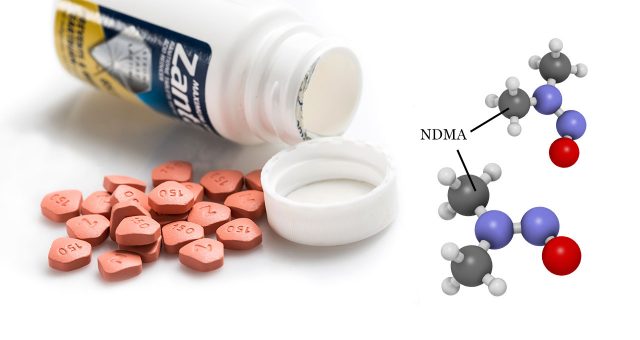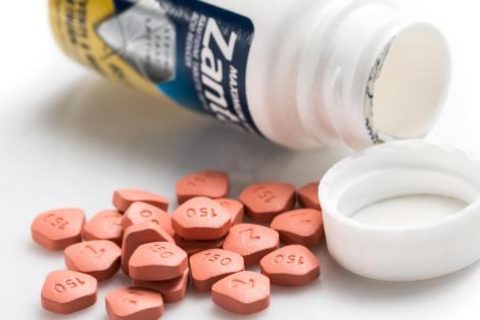Zantac Lawsuit
Zantac lawsuits claim Zantac with NDMA-contaminated ranitidine caused people to develop cancer. Sanofi and Pfizer have offered up to $350 million to settle more than 14,000 Zantac lawsuits.
Latest Zantac Lawsuit Settlements
In May 2024, Sanofi agreed to pay between $200 million and $250 million to settle more than 10,000 Zantac lawsuits.
In April, 2024, Sanofi offered $100 million to settle 4,000 Zantac lawsuits.
GlaxoSmithKline also settled multiple cases confidentially early in 2024.
As of July 2024, 2,422 Zantac lawsuits were pending in a multidistrict litigation in the U.S. District Court for the Southern District of Florida. Drugwatch’s legal partners are currently not accepting Zantac lawsuit cases.
Why Were Zantac Lawsuits Being Filed?
People who took Zantac made with ranitidine and developed cancer filed lawsuits after manufacturers issued ranitidine and Zantac recalls for the potential risk of cancer. FDA found Zantac’s active ingredient ranitidine contained N-Nitrosodimethylamine (‘NDMA’) — a probable human carcinogen.
One plaintiff, using the initials VB to protect her privacy, told Drugwatch that she filed a Zantac lawsuit after she lost her husband to stomach cancer.
“My husband was my soulmate, the love of my life and a loving father to our two sons. He took Zantac daily, as recommended, and it killed him. Stomach cancer. In the last year he lost nearly half his body weight and in the last three months, vomited every single hour until he died in my arms, weighing a hundred pounds. It was brutal and heartbreaking and has left us devastated. His sons were twelve and seventeen. Not a day goes by that I don’t think of him. I will never be the same. May he rest in peace, because I cannot,” VB said.
“William was my soulmate, the love of my life and a loving father to our two sons. He took Zantac daily, as recommended, and it killed him. Stomach cancer.”
The FDA told all manufacturers to stop selling Zantac made with ranitidine in the United States in April 2020 because NDMA contamination can increase over time. The longer the drug sits on the shelf, the greater the amount of NDMA in the drug and the FDA doesn’t know how long NDMA has been in Zantac. Sanofi’s new drug, Zantac 360 made with famotidine is not a part of the recalls or lawsuits.
In December 2022, a judge dismissed thousands of Zantac cases because they claimed there wasn’t enough evidence. Plaintiffs plan to appeal.
- Lawsuits claimed Zantac’s design is defective because its active ingredient, ranitidine, is an unstable molecule.
- The Zantac drug label failed to properly warn the public about the risk of cancer
Which Cancers Were Named in Zantac Lawsuits?
People who have taken Zantac and filed lawsuits reported a wide variety of cancers linked to the drug and NDMA.
Many doctors who diagnosed people with cancer after taking Zantac said they had no family history or genetic markers for cancer, according to Zantac lawyers. Instead, doctors told patients it was caused by something from their environment, which could include NDMA contamination.
- Bladder
- Gastric/Stomach
- Esophageal
- Liver
- Pancreatic
Of the cancers linked to Zantac, bladder cancer has the strongest connection. If you developed one of the above cancers after taking Zantac between January 2000 and present, make sure you contact an attorney to see if you qualify to file a lawsuit.
Other health issues in addition to cancer may be claimed in lawsuits. Make sure you tell your attorney about any other health problems.
Other Health Issues That May Appear with a Zantac Cancer Diagnosis
Doctors who diagnosed people with cancer after taking Zantac also diagnosed them with primary pulmonary hypertension (PPH) and Crohn’s disease.
- Primary Pulmonary Hypertension (PPH) is a rare lung disorder that causes high blood pressure in the lungs. It happens when the blood vessels in the lungs narrow and raise the pressure in the pulmonary artery above normal levels.
- Crohn’s disease is a type of inflammatory bowel disease. It causes the digestive tract to become inflamed and this causes severe diarrhea, abdominal pain, cramps and weight loss.
Who Qualified for a Zantac Lawsuit?
People who filed Zantac lawsuits took brand-name Zantac and had to meet several criteria to qualify to file a lawsuit. Generic ranitidine was not included in lawsuits.
- Have taken brand-name Zantac made with ranitidine for at least one year before being diagnosed with cancer.
- Been diagnosed with bladder, stomach, esophageal, liver or pancreatic cancer.
- Be younger than 20 years of age between the last time they took Zantac and their first cancer diagnosis.
- Be younger than 89 years old at the time of their first cancer diagnosis.
- Have used Zantac at least once a week for one year or longer.
Lawyers are the only ones who can properly evaluate a claim, and they can help gather medical records and evidence to build a case.

Plaintiffs Claimed Defendants Failed To Warn About Zantac Cancer Risk
The main claim in Zantac lawsuits was that defendants failed to warn the public adequately that Zantac’s active ingredient, ranitidine, is unstable and can form NDMA in the stomach, which in turn leads to an increased risk of cancer. Plaintiffs demand to be compensated for injuries and pain and suffering.
Joseph L. Galimidi Sued Sanofi for Breast Cancer
Florida resident Joseph L. Galimidi was one of the first to file an individual Zantac lawsuit in the United States against Sanofi on Sept. 13, 2019. Galimidi had been taking Zantac since 2009 and developed breast cancer, which is rare in men, in 2013.
He demanded compensation for his injuries, pain and suffering.
“Despite their knowledge of the risks of cancer associated with Ranitidine and Zantac … Defendants continued to represent that Ranitidine products, including Zantac, did not pose any risks of cancer or other serious health conditions.”
“While his heartburn was healed, Zantac — laden with N-Nitrosodimethylamine (“NDMA”), a probable human carcinogen — wreaked havoc in his body and led to his breast cancer,” Galimidi’s complaint said.
During the time Zantac and other ranitidine products have been sold in the United States, there have been reports of cancers linked to Zantac. Galimidi argues Sanofi had plenty of time to study the link and warn the public, but it did not.
Mark Allan Blake Said Zantac Caused Bladder Cancer
Colorado resident Mark Allan Blake filed his Zantac lawsuit against Sanofi US Services Inc., Chattem Inc., Boehringer Ingelheim, Pfizer and GlaxoSmithKline on Oct. 21, 2019.
Blake started taking prescription Zantac in 1996. He then switched to Zantac OTC which he took four times a week. Doctors diagnosed him with bladder cancer in 2018, and he believes the drug caused it.
According to Blake’s complaint, research has shown that Zantac can produce high levels of NDMA since at least 1981. Manufacturers should have known this and warned the public, but they did not.
“This was not done by accident or through some justifiable negligence. Rather, Defendants knew that it could turn a profit by convincing consumers that Zantac was harmless to humans, and that full disclosure of the true risks of Zantac would limit the amount of money Defendants would make selling Zantac,” Blake’s complaint said.
Veterans Filed Lawsuits
Zantac was a popular medication prescribed to military veterans through the VA, and now veterans are filing lawsuits after getting a cancer diagnosis.
After the FDA issued its market withdrawal notice, the Defense Health Agency (DHA) advised military beneficiaries to talk to their doctors about a prescription Zantac alternative in a communication dated April 15, 2020.
DHA advised beneficiaries taking OTC Zantac to stop taking it immediately and dispose of the medication according to FDA guidelines. DHA told patients to report any Zantac adverse reactions to the FDA.
The DHA notice didn’t warn veterans specifically about cancer risk and NDMA, but it did warn that “the impurity in some ranitidine products increases over time when stored at higher than room temperatures and may result in consumer exposure to unacceptable levels of this impurity.”
Zantac Manufacturers Named in Lawsuits
Brand name Zantac manufacturers in lawsuits include Sanofi-Aventis U.S. LLC, Sanofi US Services Inc., Chattem Inc., Boehringer Ingelheim, Pfizer and GlaxoSmithKline.
In July 2021, Judge Robin L. Rosenberg dismissed cases against generic drugmakers including Teva Pharmaceuticals, Amneal Pharmaceuticals and others because federal law prevents them from being sued.
If you have questions on whether or not your brand of ranitidine is included in lawsuits, make sure to contact a lawyer.
Status of Zantac Lawsuits
The first Zantac trial for bladder cancer is tentatively set for February 2024 in Alameda County, Calif., as part of the California Zantac Judicial Council Coordination Proceeding (JCCP).
As of November 2024, 2,422 cases were pending in the federal MDL in Florida. These cases have gone through Daubert hearings. In these hearings, the judge allowed plaintiffs to submit extra expert scientific reports.
Questions About Zantac Lawsuits
Calling this number connects you with a Drugwatch.com representative. We will direct you to one of our trusted legal partners for a free case review.
Drugwatch.com's trusted legal partners support the organization's mission to keep people safe from dangerous drugs and medical devices. For more information, visit our partners page.




